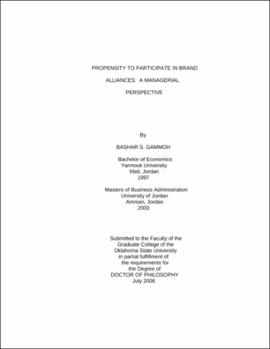| dc.contributor.advisor | Voss, Kevin E. | |
| dc.contributor.author | Gammoh, Bashar S. | |
| dc.date.accessioned | 2013-11-26T08:25:40Z | |
| dc.date.available | 2013-11-26T08:25:40Z | |
| dc.date.issued | 2006-07 | |
| dc.identifier.uri | https://hdl.handle.net/11244/6815 | |
| dc.description.abstract | Scope and Method of Study: A review of the brand alliance literature indicates that while scholars have concentrated on understanding consumers' reactions to brand alliances, the antecedents of firm participation in brand alliances are still not well understood. The purpose of this research is to fill this gap by investigating brand alliance formation at the firm level. Therefore, based on a review of relevant literature, this research developed a conceptual framework of brand alliance formation and empirically test a subset of this framework focused on firm-level alliance capabilities (i.e., alliance competence) and brand-level attributes (i.e., product quality) as antecedents of firms' propensity to brand ally. In addition, this research attempts to empirically test the moderating effects of firm level motivational factors (e.g., market entry/penetration) and managerial attitudes (e.g., attitude toward brand alliances) on the proposed relationships. Research hypotheses were empirically tested with rigorous research methods on a national sample of senior marketing executives and brand managers. | |
| dc.description.abstract | Finding and Conclusions: Results indicate a significant direct relationship between alliance experience and alliance competence. More importantly, valence of alliance experience was shown to exhibit a moderating influence on the relationship between alliance experience and alliance competence. That is, the more positive alliance experience is the stronger the relationship between alliance experience and alliance competence. In addition, results indicate that alliance competence positively influenced propensity to brand ally. Although attitude toward brand alliances didn't moderate the relationship between alliance competence and propensity to brand ally, it has a strong and positive direct influence on propensity to brand ally. The empirical findings failed to support part of the proposed model. More specifically, the proposed influence of brand quality on propensity to brand ally was not significant. Also, the interaction effects of the three brand motivational variables on the relationship between brand quality and propensity to brand ally and the relationship between alliance competence and propensity to brand ally were also not significant. Several potential explanations for the non-significant results were explored. Next, theoretical and practical implications of study results were discussed. Finally, research limitations and directions for future research were presented. | |
| dc.format | application/pdf | |
| dc.language | en_US | |
| dc.rights | Copyright is held by the author who has granted the Oklahoma State University Library the non-exclusive right to share this material in its institutional repository. Contact Digital Library Services at lib-dls@okstate.edu or 405-744-9161 for the permission policy on the use, reproduction or distribution of this material. | |
| dc.title | Propensity to participate in brand alliances: A managerial perspective | |
| dc.contributor.committeeMember | Frankwick, Gary Lynn | |
| dc.contributor.committeeMember | Flaherty, Karen E. | |
| dc.contributor.committeeMember | White, Margaret A. | |
| osu.filename | Gammoh_okstate_0664D_1899 | |
| osu.accesstype | Open Access | |
| dc.type.genre | Dissertation | |
| dc.type.material | Text | |
| thesis.degree.discipline | Business Administration | |
| thesis.degree.grantor | Oklahoma State University | |
